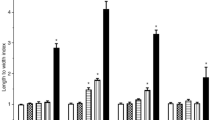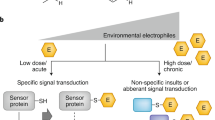Abstract
THE ability to detoxicate and eliminate potentially harmful substances from the body represents a defence mechanism, the importance of which is well established. It has been assumed that the protective devices themselves, the detoxication mechanisms, have evolved to protect the organism from potentially harmful chemicals occurring naturally in the environment. These chemicals, usually described as foreign, are rendered harmless by metabolic transformations and modified compounds are subsequently excreted usually in the urine or bile. The liver is generally regarded as the major organ of detoxication.
This is a preview of subscription content, access via your institution
Access options
Subscribe to this journal
Receive 51 print issues and online access
$199.00 per year
only $3.90 per issue
Buy this article
- Purchase on Springer Link
- Instant access to full article PDF
Prices may be subject to local taxes which are calculated during checkout
Similar content being viewed by others
References
Powell, G. M., Curtis, C. G., and Dodgson, K. S., Biochem. Pharmac., 16, 1997–2001 (1967).
Fisher, R. B., and Parsons, D. S., J. Physiol., Lond., 110, 36–46 (1949).
Capel, I. D., French, M. R., Millburn, P., Smith, R. L., and Williams, R. T. Xenobiotica, 2, 25–34 (1972).
Author information
Authors and Affiliations
Rights and permissions
About this article
Cite this article
POWELL, G., MILLER, J., OLAVESEN, A. et al. Liver as major organ of phenol detoxication?. Nature 252, 234–235 (1974). https://doi.org/10.1038/252234a0
Received:
Revised:
Issue Date:
DOI: https://doi.org/10.1038/252234a0
This article is cited by
-
An insight into the hepatoprotective role of Velpatasvir and Sofosbuvir per se and in combination against carbon tetrachloride-induced hepatic fibrosis in rats
Environmental Science and Pollution Research (2023)
-
Combining in vitro embryotoxicity data with physiologically based kinetic (PBK) modelling to define in vivo dose–response curves for developmental toxicity of phenol in rat and human
Archives of Toxicology (2013)
-
Glucuronidation in rat intestinal epithelial cells
Archives of Toxicology (1984)
-
Free and conjugated 3-methoxy-4-hydroxyphenylglycol in human urine: Peripheral origin of glucuronide
Psychopharmacology (1983)
-
Glucuronide and sulfate catecholamine conjugates in rat and human plasma
Journal of Neural Transmission (1983)
Comments
By submitting a comment you agree to abide by our Terms and Community Guidelines. If you find something abusive or that does not comply with our terms or guidelines please flag it as inappropriate.



